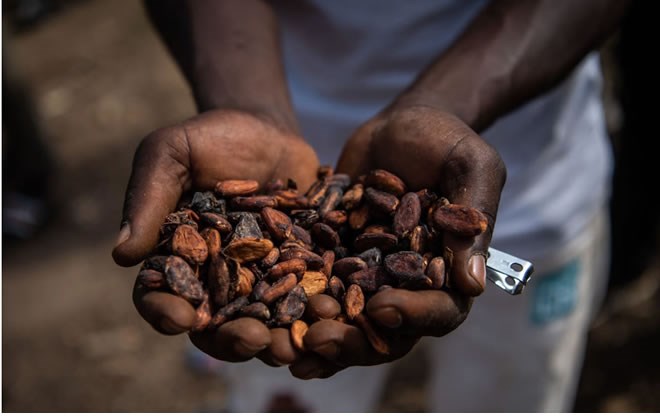
Wednesday July 17, 2019

A worker holds dried cocoa beans outside a cooperative facility earlier this year in the village of Gloplou, Côte d'Ivoire. (Salwan Georges/The Washington Post)
Cocoa products imported into the United States that rely on forced child labor should be stopped at the border, two U.S. senators wrote in a letter Tuesday to the Department of Homeland Security.
U.S. law gives customs officials the authority to block the importation of goods produced with forced labor, and Sens. Sherrod Brown (D-Ohio) and Ron Wyden (D-Ore.) wrote there is “overwhelming evidence” to justify use of that authority with regard to cocoa from Ivory Coast, the world’s leading producer.
The letter cited a June article in The Washington Post that detailed the use of child labor on the country’s cocoa farms and the failure of the world’s largest chocolate companies to fulfill a promise to eradicate the practice from their supply chains by 2005.
Blocking cocoa from the Ivory Coast, as well as the chocolate produced from it, would have broad effects on the U.S. chocolate and cocoa industry. The West African nation produces roughly a third of the world’s supply.
“Given the prevalence of forced child labor in the Ivory Coast’s cocoa sector, it is clear at least some, if not a significant portion of those imports, were produced with forced child labor,” states the letter from Brown and Wyden. “It is time the U.S. took more aggressive action to combat forced child labor in the cocoa sector.”
In addition, the letter said, authorities should pursue a criminal investigation into the importation of cocoa products tainted by forced child labor.
Legislators have struggled for years to block imported goods that have been produced by forced labor. A long-standing law enabled customs agents to block such imports, but an exemption allowed their importation if the goods could not be obtained elsewhere.
Brown and Wyden successfully pushed legislation in 2015 to close that loophole, and anti-slavery and
labor rights groups in recent years have been pushing customs officials to use their strengthened authority.
Reports of child labor have followed the global chocolate industry for years, and the practice persists throughout West Africa.
Some of the world’s largest chocolate companies — including Mars, Nestle and Hershey — promised Congress in 2001 to eradicate child labor from their supply chains. But a study sponsored by the Labor Department in 2015 reported that more than 2 million children were working on cocoa farms in Ivory Coast and Ghana. Most were working on family farms, but thousands of children are trafficked from neighboring countries to labor on the region’s cocoa farms.
“There’s every reason to believe that there’s a good case that there continues to be forced child labor in West African cocoa,” said Judy Gearhart, director of the International Labor Rights Forum, which in 2002 sought a similar investigation of cocoa. “It’s absolutely the case that customs should be investigating this. It would push forward more effective programs to ensure that there’s no forced child labor.”"
Wyden and Brown state in their letter that “the last 20 years demonstrate that the travesty of forced child labor in the global cocoa supply chain cannot be solved by chocolate companies’ self-regulation.”
The governments of Ghana and Ivory Coast also have moved in recent weeks to reduce the prevalence of child labor on cocoa farms, a practice that is often blamed on the poverty of cocoa farmers. The governments of those countries recently announced that they would be demanding higher prices for cocoa exports. Government officials say the higher prices will boost farmer incomes, reduce the incidence of child labor and give West African farmers a more equitable cut of global chocolate profits.
The disparity between chocolate company profits and the poverty of the farmers amounts to a “manifest injustice,” Ghanaian President Nana Addo Dankwa Akufo-Addo said last month. “We will not continue to be victims or pawns of the global cocoa industry that is dependent on the work of our farmers.”